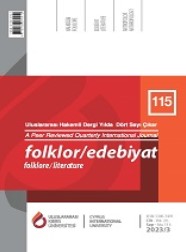Kitâb-ı Dedem Korkut Anlatılarını Anaerkil Düzen Temelinde Okumak
Reading The Kitâb-ı Dedem Qorqut Narratives on the Basis of Matriarchal Social Order
Author(s): Mehmet AçaSubject(s): Gender Studies, Cultural history, Customs / Folklore, Gender history, Theory of Literature
Published by: Uluslararası Kıbrıs Üniversitesi
Keywords: Dede Qorqut narratives; matriarchy; woman; gender; power;
Summary/Abstract: In this my study, I focus on the question of how “Kitâb-ı Dedem Korkut” narratives can be analyzed based on the concept of matriarchy and the problem of the matriarchy theory, which social and cultural anthropologists have been examining since the past. Heide Goettner-Abendroth’s views on matriarchy were at the core of my approach to matriarchy. In this study, four woman types, depicted in the introduction of “Kitâb-ı Dedem Korkut” are, other characters from the same source as Dirse Han’s unnamed wife, Banu Çiçek and Selcen Hatun, were analyzed to establish a commentary based on the matriarchal structure views of Heide Goettner-Abendroth. The study contains various excerpts from the narrative within the text which serve as indicators of the transition from the matriarchal social structure to a patriarchal one, as seen in the “Kitâb-ı Dedem Korkut”. Not only are the women in these narratives’ good lovers, wives and mothers, but they are also loyal, honest and willing to risk everything for their loved ones when necessary, which led me to draw the conclusion that it is not correct to consider them as warrior women. An approach opposite to this result would suggest ignoring the social, economic, cultural, political, and religious changes and transformations experienced by the Oghuz society at the center of the events in the book. It is possible to see the traces of mentality changes caused by this change and transformation in the narratives of these four types of women. The nomadic and warrior peoples, who transitioned into a life of permanent settlement along with the spread of Islam, have caused women to be perceived alongside the notions related with inhabitancy and housework. Women, who could and would take on the role and status of their male counterparts when needed, have become a representation of the past due to many attempts of Islamic adaptation. Another conclusion I have reached is that in the “Kitâb-ı Dedem Korkut”, the unnamed wife of Dirse Han was the only heroine who could resist the patriarchal structure of society.
Journal: Folklor/Edebiyat
- Issue Year: 29/2023
- Issue No: 115
- Page Range: 647-668
- Page Count: 22
- Language: Turkish

